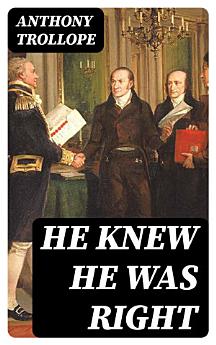He Knew He Was Right
Anthony Trollope
ພ.ຈ. 2022 · DigiCat
ປຶ້ມອີບຸກ
836
ໜ້າ
family_home
ມີສິດ
info
reportບໍ່ໄດ້ຢັ້ງຢືນການຈັດອັນດັບ ແລະ ຄຳຕິຊົມ ສຶກສາເພີ່ມເຕີມ
ກ່ຽວກັບປຶ້ມ e-book ນີ້
Anthony Trollope's "He Knew He Was Right" intricately weaves a narrative that explores the complexities of marriage, jealousy, and social conventions in Victorian England. The novel is marked by Trollope's characteristic realism and keen psychological insight, presented through a richly detailed prose style that captures the nuances of his characters' motivations. Set against the backdrop of a society rigidly adhering to class distinctions, the story follows Louis Trevelyan and his obsessive determination to control his wife, Emily, illustrating the destructive power of possessiveness in relationships. As Trollope masterfully navigates the moral and ethical dilemmas faced by his protagonists, he invites readers to question societal norms and the nature of trust within intimate partnerships. Trollope, himself a product of the Victorian era, often drew from his own experiences and observations of contemporary society. Raised in a milieu rife with the expectations of class and propriety, he was acutely aware of the challenges faced by individuals seeking autonomy within those confines. His keen understanding of both the male and female psyche allows him to craft multidimensional characters, making their tribulations resonate with authenticity. This novel comes highly recommended for anyone interested in exploring the intricacies of human relationships and social critique within a historical context. Through its compelling narrative and rich character development, "He Knew He Was Right" is an essential read for fans of classic literature and those seeking to understand the intricacies of love, power, and the bounds of societal expectations.
ກ່ຽວກັບຜູ້ຂຽນ
Anthony Trollope (1815-1882) stands as one of the most prominent and prolific authors of the Victorian era, known for his keen observations of the socio-political landscapes of his times. Trollope's early life was marred by financial struggles and an unhappy family environment, yet he found solace in his writing. He embarked on a career with the Post Office, which not only provided him with financial stability but also inspired his novel 'The Post Office' (1844). His extensive travels, particularly to Ireland, influenced his literary output and understanding of human character. Trollope's narrative style weaves intricate plots with an acute awareness of the minutiae of everyday life, echoing the realist tradition of his contemporary Charles Dickens. His work often explores the tension between tradition and the changing societal landscape. 'He Knew He Was Right' (1869) showcases Trollope's psychological depth and narrative prowess, as it examines the disintegration of a marriage against the backdrop of Victorian England's rigid social norms. The novel is revered for its character development and insight into the complexities of personal relationships. Trollope is also hailed for his Chronicles of Barsetshire series, which paints a detailed and enduring picture of English rural life. Deeply respected by critics and loved by readers, Trollope's opus of 47 novels, alongside numerous short stories and non-fiction works, continues to be celebrated and studied for its historical insight, social commentary, and compelling storytelling.
ໃຫ້ຄະແນນ e-book ນີ້
ບອກພວກເຮົາວ່າທ່ານຄິດແນວໃດ.
ອ່ານຂໍ້ມູນຂ່າວສານ
ສະມາດໂຟນ ແລະ ແທັບເລັດ
ຕິດຕັ້ງ ແອັບ Google Play Books ສຳລັບ Android ແລະ iPad/iPhone. ມັນຊິ້ງຂໍ້ມູນໂດຍອັດຕະໂນມັດກັບບັນຊີຂອງທ່ານ ແລະ ອະນຸຍາດໃຫ້ທ່ານອ່ານທາງອອນລາຍ ຫຼື ແບບອອບລາຍໄດ້ ບໍ່ວ່າທ່ານຈະຢູ່ໃສ.
ແລັບທັອບ ແລະ ຄອມພິວເຕີ
ທ່ານສາມາດຟັງປຶ້ມສຽງທີ່ຊື້ໃນ Google Play ໂດຍໃຊ້ໂປຣແກຣມທ່ອງເວັບຂອງຄອມພິວເຕີຂອງທ່ານໄດ້.
eReaders ແລະອຸປະກອນອື່ນໆ
ເພື່ອອ່ານໃນອຸປະກອນ e-ink ເຊັ່ນ: Kobo eReader, ທ່ານຈຳເປັນຕ້ອງດາວໂຫຼດໄຟລ໌ ແລະ ໂອນຍ້າຍມັນໄປໃສ່ອຸປະກອນຂອງທ່ານກ່ອນ. ປະຕິບັດຕາມຄຳແນະນຳລະອຽດຂອງ ສູນຊ່ວຍເຫຼືອ ເພື່ອໂອນຍ້າຍໄຟລ໌ໄໃສ່ eReader ທີ່ຮອງຮັບ.








